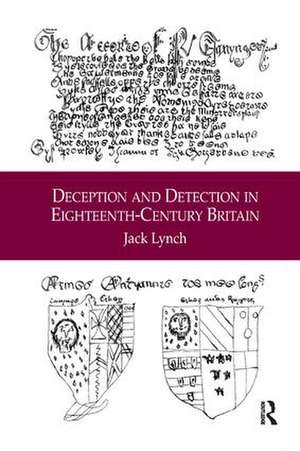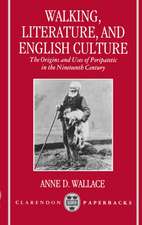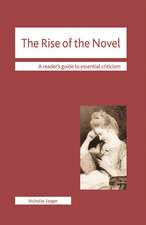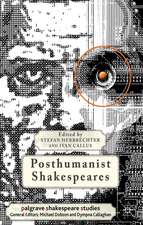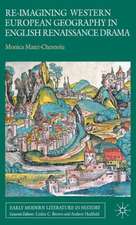Deception and Detection in Eighteenth-Century Britain
Autor Jack Lynchen Limba Engleză Paperback – 11 noi 2016
| Toate formatele și edițiile | Preț | Express |
|---|---|---|
| Paperback (1) | 489.26 lei 6-8 săpt. | |
| Taylor & Francis – 11 noi 2016 | 489.26 lei 6-8 săpt. | |
| Hardback (1) | 1056.47 lei 6-8 săpt. | |
| Taylor & Francis – 28 mar 2008 | 1056.47 lei 6-8 săpt. |
Preț: 489.26 lei
Nou
Puncte Express: 734
Preț estimativ în valută:
93.62€ • 97.75$ • 77.48£
93.62€ • 97.75$ • 77.48£
Carte tipărită la comandă
Livrare economică 04-18 aprilie
Preluare comenzi: 021 569.72.76
Specificații
ISBN-13: 9781138261945
ISBN-10: 1138261947
Pagini: 236
Dimensiuni: 156 x 234 x 13 mm
Greutate: 0.45 kg
Ediția:1
Editura: Taylor & Francis
Colecția Routledge
Locul publicării:Oxford, United Kingdom
ISBN-10: 1138261947
Pagini: 236
Dimensiuni: 156 x 234 x 13 mm
Greutate: 0.45 kg
Ediția:1
Editura: Taylor & Francis
Colecția Routledge
Locul publicării:Oxford, United Kingdom
Cuprins
Contents: Preface; Introduction; Recognizing a fake when you see one; Conviction on the first view; The utmost evidence; Truth is uniform; All manner of experience and observation; The mention of posterior facts; False recollections; Motivated malignity; Different kinds of value; Bibliography; Index.
Notă biografică
Jack Lynch is Associate Professor of English at Rutgers-Newark, The State University New Jersey, USA.
Recenzii
'Jack Lynch’s new book is a masterful and remorseless unraveling of the tangled web of "fakery studies". As much a review of current trends, and runaway fixations, in literary scholarship, this is a landmark contribution to eighteenth-century literary and cultural history: the intelligent scepticism of Lynch’s study has important implications for all those interested in the status of literary truth, authoriality, the nature of oral transmission, and the validity of evidence.' Philip Smallwood, Birmingham City University, UK 'With admirable clarity, Lynch examines implications and aspects of fraud and credulity”from Ossian to Chatterton, Mary Toft to William Henry Ireland. He does so not so as to determine whether or not fraud occurred, but rather to historicize the questions, illuminating contemporaries' understanding of literary truth, evidence, and genre.' Allen Reddick, University of Zurich, Switzerland ’Lynch displays exceptional patience in teasing out the implications of his analysis on his textual material, and, as in the most thought-provoking works in fake studies, he takes his time over reassessing the social and cultural assumptions of a period, and indeed in repositioning the language of authenticity.’ Times Literary Supplement ’...a worthwhile treatment of its subject...Recommended.’ Choice ’Lynch's book is of major importance because of the very specific and original angle he opts for. He rightly claims that 'this book is different', as he addresses, not the fakers themselves, but the critics who argued over the fakes... This approach results in a fascinating and convincingy argued account of some major changes in our ways of thinking about authorial authenticity, the nature of evidence, and the connection between reputation and literary values. Well-written and entirely jargon-free...’ Sharp News ’Deception and Detection is engaging, consistently convincing, and ought to enliven conversations about the development of histori
Descriere
In the first extended treatment of the debates surrounding public deception in eighteenth-century Britain, Jack Lynch contends that forgery and fraud make explicit the usually unspoken grounds on which Britons made sense of their world. While taking up the critical philosophical questions surrounding fraud, Lynch shows that fakery takes us to the heart of eighteenth-century values as they relate to evidence, perception and memory, the relationship between art and life, historicism, and human motivation.
